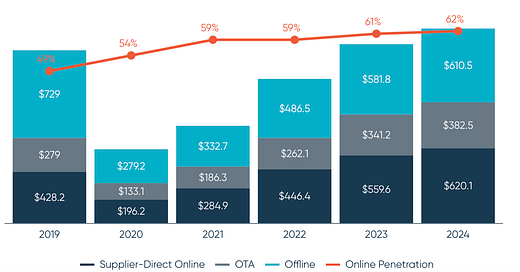As AI reshapes our lives, we see an interesting split: one world optimized for machines, another focused on human experiences. This divide isn't just about technology; it's about how we adapt and what remains uniquely human. From the future of OTAs to tourist behavior, from evolving skills to the simple joy of being silly, this edition explores where machines excel and where human qualities become even more valuable.
Thanks to OAG for sponsoring this edition of the newsletter:
The OAG Innovation Radar for 2024 highlights 28 key airline-tech innovations that made a meaningful impact. Innovations focus on distribution, ancillaries, airport terminals and flight operations. The convergence of data analytics and AI underscored many of the advancements to boost efficiency. Check-in with this review of airline-tech innovations.
1. Why AI Agents could supercharge, not bypass, OTAs
While many think AI agents will bypass Online Travel Agencies (OTAs), Mario Gavira argues they'll strengthen OTAs. His key insight is that AI agents will run on advertising revenue, and OTAs' mastery of marketing, brand trust, and technical infrastructure makes them perfectly positioned to dominate this new landscape. Read his post here and you join the animated discussion on LinkedIn.
2. Your voice
Would love to get your opinion on this poll
3. The future of web design might be two separate internets
Mark Meki installed and tested an AI flight booking tool (link) and raised an interesting question: What's the point of building cool-looking websites when they'll eventually be used predominantly by AI agents?"
We might be heading toward two types of web design: one built for AI to navigate efficiently (like booking flights, finding information, comparing products) and another focused heavily on human experience and emotion (entertainment, social connection, creativity). Travel companies might need to start thinking about whether to optimize their sites for AI agents, for human experiences, or try to balance both.
4. Two Internets? We've been here before
The two-internet pattern isn't new. Websites evolved from desktop-only to mobile-friendly to mobile-first. Travel companies have been doing this even longer, running two parallel systems: pretty interfaces for humans to book flights and machine-friendly systems (GDSs) that let computers exchange travel data and make bookings automatically.
Companies are adopting "headless architecture," which separates user interfaces from backend systems. This has been around for decades, but it's becoming more relevant now. Companies using this approach can feed one set of content to both human-friendly websites and machine-readable interfaces. Good UX for humans and efficient data access for AI.
This kind of architecture might become the norm as AI agents get better at doing things for us online. It could also lead to more creative human-focused design since you're not trying to optimize for both humans and machines in the same interface.
5. Travel market insights interactive report
Phocuswright released an interactive report, "Travel Forward: Data, Insights and Trends for 2025," offering a comprehensive look at the $1.61 trillion global travel market, with detailed breakdowns by segment, channel, and consumer behavior.
Some numbers from the report:
The global market is projected to grow 6-9% annually through 2026
Online bookings will grow faster (8-12% annually), reaching $1.2 trillion by 2026
By 2026, almost 65% of global travel bookings will be made online
North America leads with $543.8B in 2024 bookings, growing to $568.5B in 2025
UK is set to overtake France in gross bookings, returning to the top 5 markets
Hotel online bookings are expected to reach 58% of the market by 2026
50% of travelers plan to use generative AI for leisure travel
6. Human skills that might,or might not, matter in the future
I read a great essay that explores how the traits we value today might shift in the near AI-powered future. At a time when our industry is grappling with AI, automation, and the balance between digital and human experiences, these observations about what makes us fundamentally human feel especially pertinent.
Some examples of what might become less valuable:
Being a generalist. Today it's valuable to be good at many things, but if AI can match that, we'll need to be excellent at one or two things instead.
Traditional university education. With more people going to college and better ways to learn skills, degrees might matter less (though the community aspect could gain value).
Basic language skills. Real-time translation might make basic foreign language abilities less useful.
Manual skills. Robots might handle more hands-on work, except for top-tier craftspeople.
Some examples of what might become more valuable:
Trustworthiness. As AI content floods the world, being genuinely trustworthy could matter more.
Having a real audience. Not necessarily being an "influencer," but having people who truly value what you do.
In-person connections. As virtual interactions become easier, real-life connections might become more special.
Agency and resourcefulness. Being great at using tools and resources at your fingertips might matter more than just knowing things.
Read the full article and see many more examples here.
7. The Tourist-Local divide
In The Real Reason Everyone Hates Tourists, Christopher Elliott writes about anti-tourism sentiment. He offers sound advice about being respectful travelers (visiting in the off-season, avoiding overtouristed spots, learning local customs), but there's an angle worth exploring.
He cites a survey that finds that 50%+ of travelers behave "out of character" (posing in inappropriate ways with statues, talking loudly, etc.) on vacation. This is interesting data, but I'm missing a survey asking locals about their own behavior, both on vacation and at home. The data might be enlightening.
It's worth remembering that locals aren't always perfect at home or when traveling themselves, and that many of those complaining about tourists were tourists themselves before settling where they now live. A little empathy goes both ways, and a little self-awareness too.
8. Things worth knowing
In 50 Things I Know, Sasha Chapin shared insights about life, work, and human behavior. Worth a read. Here are some of them:
Travel is valuable because most knowledge can’t be written down. The most crucial info about a society is how it feels to be there. You can read a million things about Japan without knowing the bodily experience of walking around in a truly high-trust society, for example.
Being silly is a gift. You un-taboo silliness for everyone around you.
To spot real confidence, look for people who are fluid with status, who allow themselves to be the butt of a joke, or accept criticism, but also avoid false modesty, and inhabit the spotlight when it falls on them. Pro tip: people who always cling to high status aren’t confident in the normal sense, they are cult leader types, which is a different animal.
Almost nobody hears too many sincere compliments. Compliment them to their face. Then, compliment them behind their back. Practice naming pleasant feelings you have about people as soon as they bubble up, at the moment. Lower the resistance around this to zero.
9. How to be your most annoying self
We've covered people behaving badly and life lessons, but maybe we're being too serious. Here are 179 (!) funny tips on how to be deliberately annoying. Some favorites:
Phone McDonald's and try to make a reservation for that evening
If you have a glass eye, tap on it occasionally with your pen while talking to others.
Sing along at the opera.
TYPE ONLY IN UPPERCASE.
Call into work and tell them you have something better to do today.
Go to a Metallica concert wearing a Michael Bolton T-shirt.
10. Only 10 minutes
The most successful early-stage investors in Silicon Valley history, Ron Conway and Y Combinator, typically make investment decisions in under 10 minutes.
Travel Tech Essentialist Job Board
→ Explore all 1,139 open travel tech roles on the Travel Tech Essentialist Job Board now.
Fora | Director of Product Management, Booking Platform | New York City | $190,000 - $225,000
Viator | Business Operations Manager | London
Bizaway | Data Analyst | Remote
Airalo | Senior Product Manager | Remote
Fora | General Manager, Groups | New York City | $110,000 - $130,000
💼 Employers: If you want to list your jobs here, complete this quick form
📩 For monthly updates on the latest roles, subscribe to the Travel Tech Jobs newsletter
Are you fundraising?
If you are a startup looking to raise a round (from pre-seed to Series D), I can help (for free). Travel Investor Network is a private platform where I recommend innovative travel startups to investors and innovators. If you’re interested, please start by completing this form.
Travel Tech Essentialist Newsletter Sponsorship Opportunities
Reach a focused audience of travel tech professionals by sponsoring the Travel Tech Essentialist newsletter. If you're interested, please complete this form to learn more.
If you like Travel Tech Essentialist, please consider sharing it with your friends or colleagues. If you’re not yet subscribed, join us here:
And, as always, thanks for trusting me with your inbox.
Mauricio Prieto






Great edition!
BTW I do prefer this perspective on UI evolution
https://tomtunguz.com/back-to-text/
long live to chat ops!